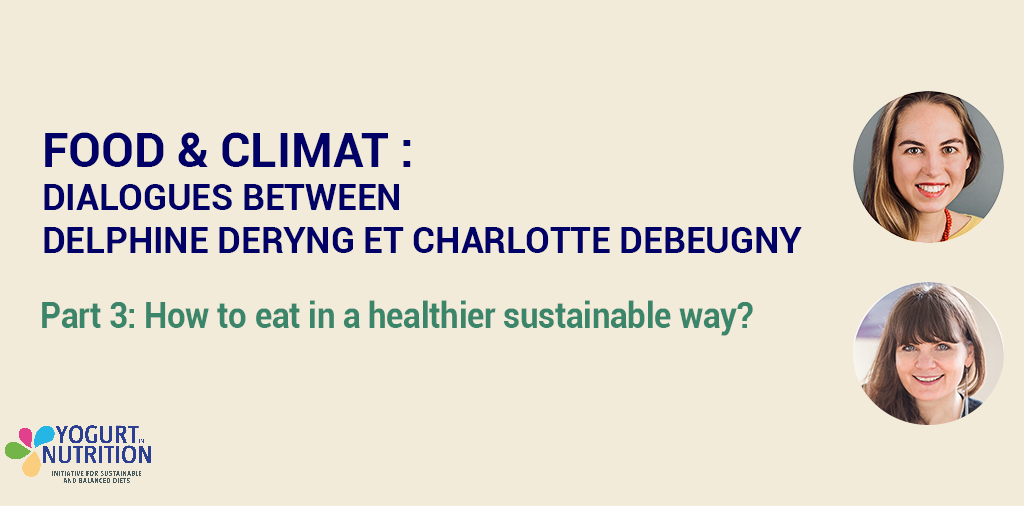Food and Climate: Dialogues between a climatologist and a nutritionist
Delphine Deryng is a climate and agriculture scientist, specializing in the issues of risk and adaptation of the agri-food sector to climate hazards, and mitigation of greenhouse gas emissions. Delphine is the lead author of the second part of the IPCC‘s sixth report, published in 2022.
Charlotte Debeugny is a registered nutritionist under British law and passionate about science and healthy cooking. We thought it would be interesting to cross their approaches and points of view. We invite you to discover this interview, through 3 episodes. This interview is in french, subtitled in english.
Part 3: How to eat in a healthier sustainable way?
According to the FAO/WHO definition, healthy and sustainable diets are eating patterns that promote all dimensions of human health and well-being. They have low environmental pressure and impact, are accessible, affordable, safe and equitable, and are culturally acceptable (FAO-WHO (2020), Healthy and sustainable diets. Guiding Principles).
In general, foods that are beneficial to health are also beneficial to the environment, which is good news.
Thus, adopting a diversified and varied diet, rich in plant products (fruits and vegetables, cereals, legumes) ensures the intake of proteins and minerals that meet nutritional needs. But the question arises concerning certain nutrients that the body needs (iron, proteins, certain vitamins such as vitamin B12) and these nutrients are found essentially in meat and animal products. The FAO recommends not to eliminate these foods but to consume them in small quantities.
In detail, regarding certain limiting nutrients:
- The proteic profiles of plants, except for soy, are often limited in essential amino acids. The combination of cereals and legumes provides a complete proteic profile. Numerous typical dishes demonstrate this: couscous with chickpeas and durum wheat, chili con carne with corn and red beans.
- Concerning iron intake, a certain vigilance is required concerning the type of iron provided by the food and its bioavailability. In particular, the bioavailability in vegetable products is low, although it is interesting to note that some cereals and legumes provide some iron (e.g. lentils). However, the intake of meat, in small portions, can be useful to cover iron needs (especially for children, teenagers and women).
- Concerning calcium intake, dairy products, in our cultures, remain quite essential. Combined with dairy proteins, phosphorus and vitamin D, calcium is more bioavailable in dairy products and has a better content. In cultures where the consumption of dairy products is more rare, calcium is provided rather by tofu or seaweed, naturally integrated in the local food culture.
For a good balance between a healthy and more sustainable diet, vegetarian and flexitarian diets are good ways to cover nutritional intakes, progressively modify eating habits, while having a positive impact on the environment.
“Every little step can help the environment – Charlotte Debeugny “
“Acting for the planet is not necessarily doing things in a rigid and strict way, there is a flexibility according to personal needs and cultural aspects – Delphine Deryng “
 Delphine Deryng is a climatologist specializing in the issues of risk and adaptation of the agri-food sector to climate hazards, and mitigation of greenhouse gas emissions. Delphine is lead author of the second part of the IPCC’s sixth report, published in 2022. She is also a visiting scholar at Humboldt University in Berlin since 2018. Delphine holds a PhD in Environmental Science from the University of East Anglia, a Master’s degree in Geography from McGill University and a Master’s degree in Physics and Cosmology from the University of Paris Diderot.
Delphine Deryng is a climatologist specializing in the issues of risk and adaptation of the agri-food sector to climate hazards, and mitigation of greenhouse gas emissions. Delphine is lead author of the second part of the IPCC’s sixth report, published in 2022. She is also a visiting scholar at Humboldt University in Berlin since 2018. Delphine holds a PhD in Environmental Science from the University of East Anglia, a Master’s degree in Geography from McGill University and a Master’s degree in Physics and Cosmology from the University of Paris Diderot.

Charlotte Debeugny
(RNutr) is a British registered nutritionist. A nutrition expert who is passionate about science and good food. She is very aware that healthy food choices are also good for the planet. She also chairs a FENS (Federation of European Nutrition Societies) working group that focuses on improving the quality of scientific communication about nutrition to the public.
For more information:
- The Intergovernmental Panel on Climate Change (IPCC) was established to provide comprehensive assessments of the state of scientific, technical and socio-economic knowledge about climate change, its causes, impacts and coping strategies. The panel is now in its 6th assessment cycle. All data is available online.



